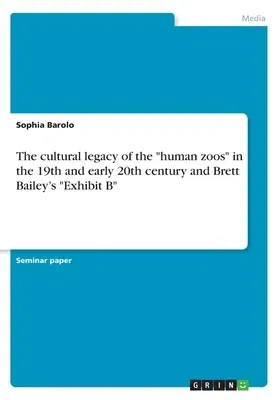Seminar paper from the year 2017 in the subject Art - History of Art,
grade: 2,3, University of Lisbon, language: English, abstract: This
paper analyzes the beginnings of the so-called "human zoos" in the late
19th and early 20th century and whether there are still continuities of
these practices in the present world. What are the consequences, what
are the impacts? It will further look into the example of Sarah
Baartman, who was objectified and exhibited 1810 to 1815, in order to
illustrate the horrible fates of people on display in Europe. Are human
beings still exhibited and exploited in the way they used to be? The
South African Artist Brett Bailey made an attempt to spread awareness of
the highly popular human zoos with his show Exhibit B. The show was
received very controversial by the public and in London the show even
had to be cancelled due to the dimensions of the protests. The question
is whether by re-creating scenes of slavery his show is able to provide
a critique of racism and human-zoos or whether it is a mere reproduction
of human zoos that is racist in itself. It is in the nature of human
kind to be curious and to observe things that are new to the eye. Only
by observation can be recognized whether something is a danger or not.
The unusual thus always exerts a strong appeal to the observer. The
"exotic" has always attracted attention. This even more when an
unfamiliar looking or "exotic" human being is concerned, a being that
seems very familiar to the viewer and possibly even shows him
similarities to himself. This is one of the reasons why "wild people"
have been displayed at fun fairs and exhibitions during centuries, and
since traveling was dangerous or not possible at all and a worldwide
media network did not exist, these exhibitions were often the only
opportunity to see people from far away in real life. It is hardly
surprising that this natural interest in the stranger has quickly been
utilized by some people for their own benefit, wheth


